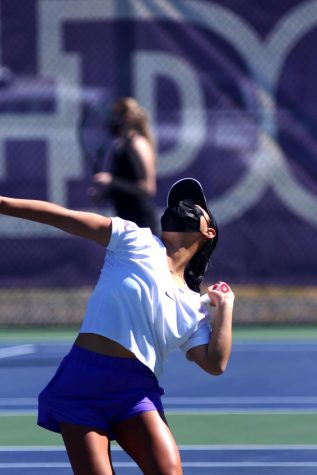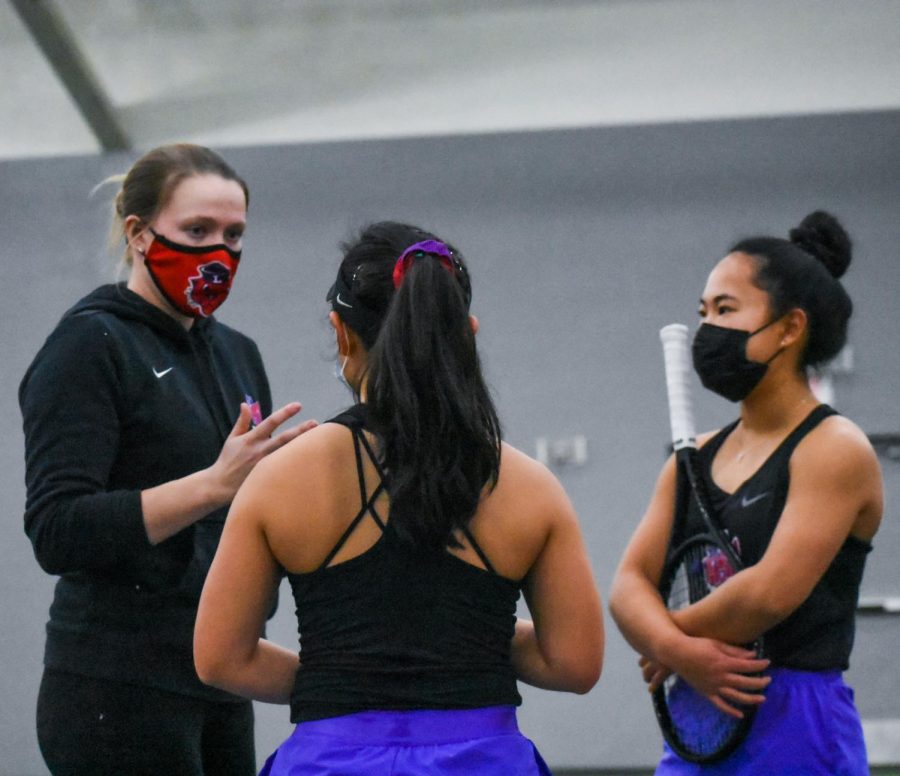Creating a culture of commitment
Riddle Maliska coaching her team
November 8, 2021
From player to coach to trainer, Ella Riddle Maliska’s Linfield tennis career has come full circle.
The 2018 Linfield graduate became the head women’s tennis coach at her alma mater during the 2020-21 season, leading the team to a 13-3 overall record and a victory in the first round of the 2021 Division III NCAA Championships.
“The tennis [coaching position] kind of fell into my lap because Coach Lisa, who was my coach when I was here, left,” Riddle Maliska said. “I really care about the tennis team and making sure that they still have somebody who looks after them and understands the culture.”
After receiving a bachelor’s degree in exercise science at Linfield, Riddle Maliska went on to complete a master’s degree in strength and conditioning with an emphasis on female athletes while she was in England coaching strength and conditioning for women’s netball and tennis.
“The strength conditioning was obviously my career choice,” Riddle Maliska said. “The tennis kind of fell into it, and it works really well right now.”
Riddle Maliska’s focus on improving female athletes’ mental and physical strength during her time in England has transferred over to her multiple coaching roles at Linfield. In addition to continuing to lead the women’s tennis team this year, Riddle Maliska has also taken on the role of leading the majority of the Linfield athletics weight training programs.
“One of my big goals is to make the ladies who might not have had these experiences in high school be able to go into a gym and feel like they have a strength coach who wants them to get stronger and stay healthy and look after themselves,” Riddle Maliska said. “That was definitely something that I missed a little bit when I was here because there just wasn’t the structure for it, so it’s nice being able to offer that now to these teams and people who want that support.”
While juggling two coaching positions has its challenges, Riddle Maliska credits her tennis team for their maturity, independence and self-sufficiency during the times she’s focused on her trainer position.
A typical day as a multi-sport coach starts with Riddle Maliska leaving her home in Portland around 5 a.m. in order for her to open the gym and start working with teams at 6 a.m. She works as the strength and conditioning coach for several teams until mid-morning before heading out to the tennis courts and working one-on-one with her players.
Riddle Maliska ends her day by running tennis practice in the evening before returning home, only to start all over again the next day.
While Riddle Maliska ultimately wants to improve the overall fitness and capability of the athletes at Linfield and improve the athletic program as a whole, her primary goals have a different focus.
“I think my first goal as the strength and conditioning coach is that [the athletes] stay as injury-free as possible,” Riddle Maliska said. “It’s not that we necessarily need to get them that much stronger or faster, it’s more about them just reducing the injuries.”
As a former collegiate athlete herself, Riddle Maliska understands how important staying healthy is for both the athletes’ physical strength and their mental strength. In order to be a successful athlete, Riddle Maliska believes that building mental strength and toughness outside of the athletes’ sports will eventually play a part in their physical and mental ability within their sport.
While not all collegiate athletes are going to continue their sport after college, Riddle Maliska stresses the importance of maintaining overall physical health and making the athletes she works with aware of how they can continue to stay active even after college.
“There’s a very small percentage chance that they end up becoming a professional athlete,” Riddle Maliska said. “My goal would be that after college, they’re able to go into a gym and lift safely by themselves and feel like they’re confident going into a gym space. If they can leave college and still be healthy and work out and maintain that…that would be my big, big goal.”

Since Riddle Maliska began working with the various teams at Linfield, she’s noticed an attitude shift in the athletes and their approach to working hard in the weight room. She believes that by creating a space that’s separate from their sport, athletes feel a different motivation to get better each and every day not only through their sport, but now also in the weight room.
“We’ve just noticed a big increase in athletes wanting to be in here,” Riddle Maliska said. “Sometimes I’ll have one of the ladies text me and say, ‘Hey, I’m stressed out and I’m not feeling it.’ I tell them that if they do come in and lift, there’s no pressure—I’m not going to be upset or mad, but it can sometimes just be that mental relaxation of being able to work out and just forget about things for a little while that can really help.”
Teaching her athletes how to approach exercising a healthy lifestyle has shown Riddle Maliska how vitally important her role as the strength and conditioning coach at Linfield has been. While some of the overarching goals of expanding the strength and conditioning program have not been reached since the program is so new, Riddle Maliska can see the path she is creating and knows that it can only get better.
“Linfield right now is known for really good sports,” Riddle Maliska said. “So creating a high performance department is kind of the next step in what needs to happen. There’s a lot of structural things that need to happen, but we’ve definitely started the ball rolling, and we’re starting something really cool.”
Although the program might be new and not every athlete has stepped on board, Riddle Maliska’s ultimate goal of creating a space where athletes can lift safely and learn how to implement a healthier lifestyle continues to grow. More and more Linfield athletes have been drawn to the weight room because of Riddle Maliska’s commitment to making them better all-around athletes.
“The fact that we have so many more people in [the weight room], lifting, looking after themselves and getting stronger is cool,” Riddle Maliska said.

